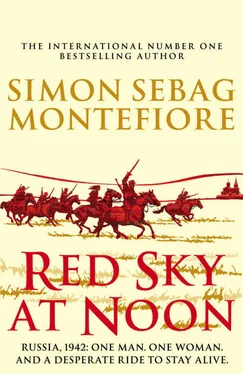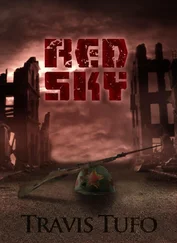‘Oh, I must go home,’ she said. ‘I have—’ She caught herself: she was about to say ‘school’! Disaster!
‘Must you go?’ Shapiro said. ‘I’m so enjoying our conversation.’ He paused and smiled at her. ‘Yes, you’re so refreshing. Not like these jaded actresses. You’re the only person here I can have a serious conversation with…’
‘Don’t mock me.’
‘No, I mean it. Your views are purely intellectual, quite untainted with vanity or ambition. Can we meet again?’
‘Yes, yes, of course. I have absolutely nothing to do every evening.’
‘You see? No one here would say that. They’d claim to be busy. Play games. And they’d already be flirting with ten men and…’ He looked at her very intensely. ‘You’re not like that at all, are you?’
She shook her head.
‘I’m going back to the front the day after tomorrow. So tomorrow night? It’ll be my last night in Moscow.’
On the way home in the back of her car, with Klimov and the driver in the front seats, she lay back and closed her eyes and gloried in what had happened. For the first time, she was absolutely happy, in her own right. Happy as a lioness with her lion.
Stalin was alone in the Little Corner with General Vasilevsky. Even Molotov and the other leaders were away and running their commissariats, directing fronts or catching a few hours’ sleep. Only the burly Chief of Staff with the big, plain face and the curl across his forehead remained.
Stalin went to the little room behind his desk and made himself tea, in a glass with a silver base and handle, then took the bottle of Armenian cognac and poured in a teaspoon of brandy, stirred and then sipped it.
The news from the south was dire. The Germans were massing vast forces to push further into the Caucasus and they were squeezing the last Soviet forces on the Don. Soon they could cross the river and charge across the steppe towards Stalingrad. Yet he knew he must hold his nerve, and seek the chance to attack; attack whatever the cost.
‘Any more news of Melishko’s Shtrafbat?’ he asked Vasilevsky after he had heard the rest of the reports.
Vasilevsky understood that Melishko’s Shtrafbat had become something of a distraction for the Supremo, almost a talisman.
‘No news of Melishko himself,’ Vasilevsky said, ‘though one of his officers informed us that he always called the Shtrafniks “my bandits”.’
Stalin blinked and Vasilevsky continued, ‘On your orders, despatched by radio, the small Second Don Partisans Brigade under Major Elmor, made up of soldiers who had escaped from Kharkov encirclements and regrouped in the Don, successfully rendezvoused with them for a joint operation against the Schuma and Cossack elements under the traitor Mandryka.’
Stalin lit up his Herzegovina Flor and watched Vasilevsky talk through the veins of white smoke. ‘And how did Melishko’s bandits do?’
‘I am waiting for confirmation of this, Comrade Stalin. I don’t like to report until I know…’
‘Tell me anyway. I won’t hold you to it.’
‘I’ve heard that at five p.m. yesterday, they assassinated the traitor Mandryka in an ambush. The partisans lost forty men. Mandryka’s security police, now commanded by the traitor Bronislav Kaminsky, have joined forces with German Einsatzgruppe D along with special task forces under Dirlewanger. They are conducting savage reprisals against villages in the area.’
‘But Mandryka is dead.’
‘Yes.’
‘How do we know this?’
‘Our source? I assume there is an agent loyal to us, a source amongst Mandryka’s Hiwi units.’
Stalin nodded, knowing more than Vasilevsky on intelligence matters: ‘Darkness is as important in war as the daylight,’ he said. ‘So, a success for Melishko’s bandits. Please radio Stavka’s congratulations to General Melishko.’
‘If that is all, Comrade Stalin, I should return to headquarters and review the latest reports.’
‘Sit down, Alexander Mikhailovich.’
Vasilevsky did as he was told. This had never happened before.
‘You know my son Yakov is a prisoner of the Germans?’
‘If that is so, it must be hard for his father,’ said Vasilevsky. Of course he knew that Stalin’s eldest son from his first marriage, Yakov Djugashvili, whose gentle, self-deprecating nature irritated his father, had been captured. But with Stalin it was prudent to be extremely careful.
Stalin stared into the air, wilting visibly, haggard and grey-faced. ‘I am just one father amongst the millions who has lost someone. I’m not special.’
‘But they must wish to use him against you?’
‘Of course,’ replied Stalin. ‘I expect it every day. His surrender was a crime and I treated him no differently from any other soldier who let himself fall into enemy hands. His wife is under arrest.’
Vasilevsky was in no hurry to commit himself. Where was this going? he wondered.
‘He was always a spineless boy. I don’t know if he was a coward or just unlucky.’
‘I am sure he was unlucky, Comrade Stalin. We can’t be responsible for our children.’ Vasilevsky shrugged. ‘They are born with characters and we can’t always change them.’
‘Perhaps you’re right.’ Stalin blew the blueish smoke towards the ceiling where it billowed and washed back. ‘If he had betrayed us, they would have paraded him by now. Perhaps Stalin’s son is braver than we all thought.’
‘In this case, no news is good news.’
Stalin examined Vasilevsky searchingly: ‘I hear your father was a priest.’
A bombshell! Vasilevsky took a breath, aware he was sweating suddenly. ‘That is correct, though obviously such elements as clergy are class enemies. I broke off relations more than ten years ago and have had no contact since then. None at all, I promise.’
Stalin nodded. ‘I was trained as a priest.’
‘Yes, Comrade Stalin.’ Vasilevsky answered this with rigid neutrality.
‘It was a good training for politics. A training in how to judge men.’
‘I can imagine that.’
‘Alexander Mikhailovich, in a time of war, it seems a shame that a son does not contact his old father.’
‘Yes, Comrade Stalin.’
‘When you have time,’ said Stalin, ‘will you contact your father again? Don’t let days or even hours pass. Death takes the old so easily. Call him from my anteroom and let him know his son cares for him. Make sure he has the right rations. Will you do that?’
‘Yes… yes, I will do it.’
‘Tonight?’
‘Yes, tonight.’
‘Goodnight, General Vasilevsky.’ And Stalin stood up and walked out of the office towards his apartment.
He was filled with a sudden, and rather surprising, yearning to see Svetlana. But oddly, Svetlana was not home. He sat at the kitchen table for a moment. He was glad he had spoken to Vasilevsky. Beria had given him this information to use against Vasilevsky, but sometimes family was as essential as ideology. Perhaps this was something the seminary had taught him. Priests were sometimes more cunning than commissars. Yes, family had its place, he thought.
As if on cue, the door opened and Svetlana, her skin gleaming and eyes bright, burst in, wearing an evening gown with eyeshadow and lipstick and her hair curled. Stalin was momentarily shocked by how grown up she looked. His little girl was too young for this!
‘Sveta, you look so…’ He had the urge to shout at her: You’re overdressed, you look ridiculous. What do you think you look like? A whore! Who gave you permission to dress like this? But after the chat with Vasilevsky, he was enjoying the mellow thought of family and love, and he quelled his fury.
‘What do you think, Papa?’ She did a twirl for him.
Читать дальше












